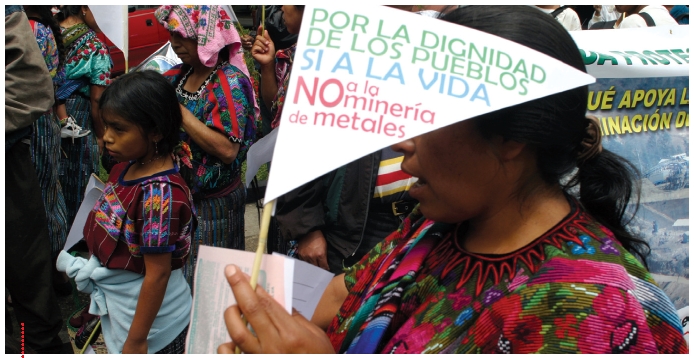By Paul McLaughlin
When Canada's Extractive Sector Corporate Social Responsibility (CSR) Counsellor, Marketa Evans, quietly resigned last October, it was a disappointing day for the CSR strategy initiated by the Ministry of International Trade almost four years earlier. The Counsellor position had been established to provide remedies, through mediation, for people who claimed to have been harmed by the overseas operations of Canadian extractive companies. During her tenure, six cases came before Evans. None resulted in a remedy.
“The track record of the CSR Counsellor … has come under some criticism,” Fasken Martineau DuMoulin LLP wrote in bulletin announcing the commencement of a five-year review of the Corporate Social Responsibility Strategy for the Extractive Sector, “and will likely be a focus of comments in this review process. During the past five years, six cases for dispute resolution were opened, three did not proceed, one case was sent back to a company's internal process and two remain open.”
In launching the review, Erin O'Toole, Parliamentary Secretary to the Minister of International Trade, announced there would be a “a round-table session in Ottawa with civil society organizations. The consultations are part of a five-year review and will help the Government of Canada develop a plan to better assist Canadian extractive companies operating abroad with their responsible business practices. These consultations complement the cross-country extractive sector consultations that the Honourable Ed Fast, Minister of International Trade, held in September and October 2013.”
It is almost certain some changes to the Counsellor's office will result from the review. Calls have been made for the appointment of an ombudsperson with investigative powers.
Another idea being floated is to give people who claim to have been hurt in countries outside Canada legal rights to Canadian courts, says Sarah Powell, a partner in the environmental and Aboriginal practice at Davies Ward Phillips & Vineberg LLP. To enshrine such rights is a well-intentioned concept, she says, but could be hard to put into practice. “How do you give standing for allegations of human-rights abuses in South America, for example? That requires a fundamental statutory change.”
Murray Klippenstein of Kilppensteins Barristers & Solicitors, counsel to 13 Guatamalan plaintiffs in Choc v. HudBay Minerals Inc., 2013 ONSC 1414, said, “I suspect most steps being considered will be toothless compared to ordinary legal principles in courts.”
In Hudbay, the defendant had initiated three motions arguing that plaintiff allegations of human rights should be dismissed. Superior Court of Ontario Justice Carole Brown held they should not be dismissed at that stage. Her decision centred on “ordinary legal principles”, as had the pleadings from both plaintiffs and the defendant, including: direct or vicarious liability and piercing the corporate veil.
Even before the HudBay decision, Canadian mining companies – and their counsel – have been making efforts to ensure the extractive sector has meaningful CSR requirements. Meanwhile, the executive director of the Prospectors & Developers Association of Canada, Ross Gallinger, shared PDAC's main recommendation to the review: “that host country capacity-building be the centrepiece of the government's strategy going forward. This is where the [federal government], working in partnership with the provinces and territories … has a global comparative advantage that should be leveraged to support responsible resource development abroad. A focus on host country governance capacity-building would help create an enabling environment for responsible exploration and mining in the countries where companies actually operate.”
It is unclear what will result from the CSR review. Sarah Powell, who believes the Canadian mining industry “has been very willing to embrace transparency and ensure a level playing field” – especially publishing what they pay to governments – thinks there's been a very low-key response to the CSR review. “It's a very complex and complicated process,” she says, in what is perhaps an understatement.
When Canada's Extractive Sector Corporate Social Responsibility (CSR) Counsellor, Marketa Evans, quietly resigned last October, it was a disappointing day for the CSR strategy initiated by the Ministry of International Trade almost four years earlier. The Counsellor position had been established to provide remedies, through mediation, for people who claimed to have been harmed by the overseas operations of Canadian extractive companies. During her tenure, six cases came before Evans. None resulted in a remedy.
“The track record of the CSR Counsellor … has come under some criticism,” Fasken Martineau DuMoulin LLP wrote in bulletin announcing the commencement of a five-year review of the Corporate Social Responsibility Strategy for the Extractive Sector, “and will likely be a focus of comments in this review process. During the past five years, six cases for dispute resolution were opened, three did not proceed, one case was sent back to a company's internal process and two remain open.”
In launching the review, Erin O'Toole, Parliamentary Secretary to the Minister of International Trade, announced there would be a “a round-table session in Ottawa with civil society organizations. The consultations are part of a five-year review and will help the Government of Canada develop a plan to better assist Canadian extractive companies operating abroad with their responsible business practices. These consultations complement the cross-country extractive sector consultations that the Honourable Ed Fast, Minister of International Trade, held in September and October 2013.”
It is almost certain some changes to the Counsellor's office will result from the review. Calls have been made for the appointment of an ombudsperson with investigative powers.
Another idea being floated is to give people who claim to have been hurt in countries outside Canada legal rights to Canadian courts, says Sarah Powell, a partner in the environmental and Aboriginal practice at Davies Ward Phillips & Vineberg LLP. To enshrine such rights is a well-intentioned concept, she says, but could be hard to put into practice. “How do you give standing for allegations of human-rights abuses in South America, for example? That requires a fundamental statutory change.”
Murray Klippenstein of Kilppensteins Barristers & Solicitors, counsel to 13 Guatamalan plaintiffs in Choc v. HudBay Minerals Inc., 2013 ONSC 1414, said, “I suspect most steps being considered will be toothless compared to ordinary legal principles in courts.”
In Hudbay, the defendant had initiated three motions arguing that plaintiff allegations of human rights should be dismissed. Superior Court of Ontario Justice Carole Brown held they should not be dismissed at that stage. Her decision centred on “ordinary legal principles”, as had the pleadings from both plaintiffs and the defendant, including: direct or vicarious liability and piercing the corporate veil.
Even before the HudBay decision, Canadian mining companies – and their counsel – have been making efforts to ensure the extractive sector has meaningful CSR requirements. Meanwhile, the executive director of the Prospectors & Developers Association of Canada, Ross Gallinger, shared PDAC's main recommendation to the review: “that host country capacity-building be the centrepiece of the government's strategy going forward. This is where the [federal government], working in partnership with the provinces and territories … has a global comparative advantage that should be leveraged to support responsible resource development abroad. A focus on host country governance capacity-building would help create an enabling environment for responsible exploration and mining in the countries where companies actually operate.”
It is unclear what will result from the CSR review. Sarah Powell, who believes the Canadian mining industry “has been very willing to embrace transparency and ensure a level playing field” – especially publishing what they pay to governments – thinks there's been a very low-key response to the CSR review. “It's a very complex and complicated process,” she says, in what is perhaps an understatement.
Lawyer(s)
Sarah V. Powell
Murray Klippenstein
Firm(s)
Davies Ward Phillips & Vineberg LLP
Murray Klippenstein, Barrister & Solicitor





